

As a result, the growth of the movement offline was directly linked with the online conversation. Organizers of Black Lives Matter made social media – and specifically the hashtag #BlackLivesMatter – a centerpiece of their strategy. This was the case with the Black Lives Matter movement. In mid-2014, as the issue of use of force by police gained national attention due to several high profile cases involving black men, some activists promoted hashtags as a way to identify their messages and display solidarity. While most hashtags are developed organically, some groups deliberately use hashtags to promote a message. In 2009, Twitter began to hyperlink and compile hashtags, making them searchable and increasing their utility as identifiers. Historically, hashtags developed as an informal method of highlighting ideas in unformatted text and trying to grow conversation around a topic. (A previous Pew Research Center study surveyed Americans on their awareness of and attitudes towards issues of racial equality.) These tweets (13.3 million in total) were then analyzed using Crimson Hexagon’s algorithmic tool to determine their subject matter and tone. According to Twitter, #Ferguson was the most used social-issue hashtag in the 10-year history of the platform, while #BlackLivesMatter was third.Īlong with examining tweets that mentioned race in a general sense, the Center’s analysis looked at all tweets that included the #BlackLivesMatter and #AllLivesMatter hashtags from July 12, 2013, to March 31, 2016. Two of the top three were directly related to issues of race. On Twitter’s 10-year anniversary, the site published a list of the most used hashtags related to social causes. It’s great for writers who can’t afford to sign up for a writing workshop and need some inspiration.In recent years, social media have become a common way for political groups and social movements to organize. #writingprompt: Sometimes a 140 word or less prompt is all that you need to nudge you back into action.

It’s also a way to spread awareness about supporting independent bookstores. Often times booksellers or customers use it to share a funny thing overheard in the bookstore. #bookstorebingo: This is one of my personal favorites, and one that I wish more people would use. #fridayreads: One of the most popular literary hashtags of all time was started by writer and book critic Bethanne Patrick several years ago, and it’s still one of the best ways to find out about good books. The original Twitter exchange was in reaction to the lack of a diverse representation of children’s authors at the BookCon conference held in NYC in May. It just goes to show how conversations between a few people can lead to an actual movement. The best part of this hashtag is that the movement started on Twitter. #WeNeedDiverseBooks: We Need Diverse Books “is a grassroots organization created to address the lack of diverse, non-majority narratives in children’s literature.” Writers and publishing professionals have teamed up to tackle an important issue. Many of the best literary agents are on Twitter, and periodically take part in this very useful ongoing Q&A where they answer questions from writers. Even if you DO live in the heart of publishing, it can still difficult be to get their attention. If you don’t live in NYC, it can feel almost impossible to connect with them. It's great to have a hashtag (and a Twitter handle) that encourages people to read more books by female writers. #readwomen2014: Created by writer Joanna Walsh this is a place for people to talk about the books they are reading, the authors they admire, link to relevant essays and articles and even share quotes from some of the books. If you’re procrastinating, it’s a way to make you feel just slightly guilty and hopefully give you the push you need.

But when you’re stuck in front of a computer screen for most of the day, just knowing that other people are plodding through a Word document at the same time as you is encouraging. #amwriting: Yes, it’s a bit of a humblebrag seemingly directed at those writers who might be at their day job or experiencing writers block. And some of the most interesting and useful hashtags on Twitter are designed to build community in the far-flung literary world. But there are also some that, for good reason, hang around for awhile. There are plenty of stupid hashtags in the Twittersphere that pop up for a day or so and fade away.


 0 kommentar(er)
0 kommentar(er)
